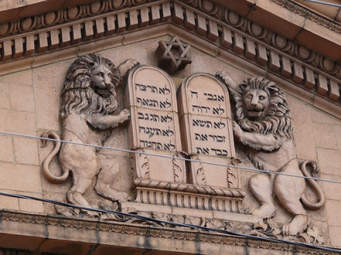
Stephen
Terry, Director

The
“Change” of the Law
Commentary
for the May 12, 2018 Sabbath School Lesson
 “After
them another king will arise, different from the earlier ones; he will subdue
three kings. He will speak against the Most High and oppress his holy people
and try to change the set times and the laws.” Daniel 7:24b-25a, NIV
“After
them another king will arise, different from the earlier ones; he will subdue
three kings. He will speak against the Most High and oppress his holy people
and try to change the set times and the laws.” Daniel 7:24b-25a, NIV
Unfortunately, our lesson in the quarterly has tried to
cover far too much territory to be dealt with either in this commentary or in a
single Sabbath School lesson. Apparently the lesson author recognized this and
in spite of the allusion to fantastic beasts and many layers of symbology like
horns, crowns, mysterious locales and references to dragons, little is said
about these images and perhaps rightly so. Adequate treatment of all of them
would require far more than a typical forty-five minute class before the sermon
hour. Therefore the lesson author defaulted to a discussion regarding the
Sabbath and its ongoing importance for God’s people. In particular, I am
referring to the seventh-day Sabbath, not to be confused with the Sunday
worship on the first day of the week often called Sabbath by many Christians
today. More about that later, but first let’s consider some Sabbath history.
Why is the seventh day significant, rather than the first?
The Bible seems to provide the answer very early on.
Genesis, chapter 1,[i]
contains the account of the creation of the Earth, said to have taken place
over six days. Some may see this as a literal six days, while others may see
this as a metaphorical account, but no matter how it is seen, the capstone to
the account comes at the beginning of chapter two, with the creation of the
Sabbath on the seventh day.[ii] This also may be
understood on two different levels. Literally, it is the establishment of a
twenty-four hour period of rest every seven days. Metaphorically it carries
deeper profundities as the writer of Hebrews shared with his readers.[iii] The Genesis account may
even be seen as the anti-typical weekly Sabbath reminder of the typical rest of
salvation identified in Hebrews.
Interestingly, the word Sabbath is not used in the
Genesis passage and neither the seventh day nor the Sabbath recur as we
understand them today until the Exodus. One might infer that it was not
observed continuously during that period, often referred to as the patriarchal
period. There might be some justification for that understanding for when the
Sabbath is mentioned again in connection with the giving of the Ten
Commandments,[iv]
it is the only commandment that begins with the word “remember.” The obvious
implication is that the people had forgotten it. Of course that begs the
question. If the continuity of observance is broken, how can we be sure that we
are worshipping on the correct day? Why couldn’t Sunday be the correct day?
This is a reasonable question, and fortunately for
Christians, one that is easily resolved. Christians are called Christians because
they aspire to the example of Christ. We aspire to His compassionate and caring
nature and example of humble service to others. But often overlooked is another
example. He regularly attended synagogue, and He did so on the seventh-day
Sabbath which we call Saturday.[v] That appears to be
endorsement of the practice. How do we know that it was Saturday? The evidence is
clear from His crucifixion, burial and resurrection. Christianity recognizes
that His crucifixion occurred on Good Friday and that His resurrection occurred
on Easter Sunday. That means the time spent in the tomb was primarily on
Saturday. Since the Sabbath was observed from sundown on Friday until sundown
on Saturday and the women who wished to anoint Jesus body did not do so because
of the Sabbath, but returned on Sunday to perform that work,[vi] there is little doubt which
day was the Sabbath in the days when Jesus walked the dusty roads of Palestine.
Why is this significant? It is important because the Jews have never lost track
of the Sabbath since that time and continue to recognize and observe it to the
present day. And because as Christians we know which days of the week are Good
Friday and Resurrection Sunday, we know which day is the Sabbath as well.
Recognizing that, some might claim that the Sabbath was
for the Jews and that Christians are under a new dispensation and therefore
Sabbath observance has become immaterial to them. They trace that change to the
cross. But if this were true, one would expect to see that in the behavior of
the Disciples. However there are eighty-four instances of seventh-day Sabbath
observance after the resurrection and ascension of Jesus. A simple word study
of “Sabbath” with a concordance will bear out the accuracy of this statement.
While there are a few examples of Paul meeting with believers in meetings that
apparently carried over into the first day of the week, there is no indication
that this happened regularly.[vii] Interestingly, the
meeting referenced in Acts, chapter 20, was a night meeting. If we consider the
method of reckoning the days back then with the night portion preceding the
daylight portion. Then what they would have called the night before midnight on
the first day of the week would actually be what we would call Saturday night
today. This also explains why Paul would travel the next morning, for if the
first day of the week were now the Sabbath, he would have rested per the
commandment rather than traveled during that day. So if the disciples continued
with Jesus’ example and observed the seventh-day Sabbath after Jesus’
ascension, how did most of Christianity come to worship on a different day?
Some would tie the change to the Jewish revolts against
Roman rule. The first of these was in 70 CE which culminated in the Roman destruction
of the temple, an event commemorated on the Arch of Titus in Rome where the Romans
are depicted carrying off the furnishings of the temple. No doubt this revolt
resulted in some animosity toward the Jews, and the Christians, who at that
time were seen as simply another sect of the Jews, were included as targets of
that ire. As a result Christians began to differentiate themselves from
Judaism, perhaps to escape persecution. This resulted in a permanent split from
Judaism in the early second century when the instigators of the Bar-Kokhba
revolt expected the Christians as loyal Jews to join with their Jewish brothers
against the Romans. When the Christians demurred, they were seen as traitors by
the other Jews. Nonetheless this had several advantages for the Christians.
First, the Romans could see that Christians were not Jews. Second, when
Jerusalem was rebuilt after the revolt as a Roman city, Aelia Capitolina, Jews
were banned, but Christians could still enter. Emperor Hadrian also
specifically banned Sabbath observance. As a result, the administration of
church congregations and properties that had previously been administered by
converts who still considered themselves to be practicing
Jews, passed over to Gentile Christians who could freely come and go. It is perhaps
at this time that seventh-day Sabbath observance began to wane. Much of this is
documented in the book “Partings –How Judaism and Christianity Became Two,”
edited by Hershel Shanks, especially the chapter “From Sabbath to Sunday: Why,
How and When?” by Lawrence T. Geraty which greatly informed what I have just
shared.
There is some documentation in the writings of the early
church fathers of an anti-Semitic animosity that grew in the church over time,
perhaps one of the better known sources from early in the second century is
that of Bishop Ignatius of Antioch who wrote in his Epistle to the Magnesians
of “those who had lived in antiquated practices came to newness of hope, no
longer keeping the Sabbath but living in accordance with the Lord's day, on
which our life also arose through Him and His death…” Since this epistle precedes
the Bar-Kokhba revolt, it may be evidence of efforts by the early church to
distance themselves from Judaism. The
spurious Epistle of Barnabas which nonetheless is dated to the time of the
revolt also speaks of celebrating the day of the resurrection in lieu of the
Sabbath. Although it is not authoritative, it is evidentiary of the sentiment
of the early 2nd century. While it is impossible to fix the exact
point when Christians began to observe Sunday rather than Saturday, there is
ample historical evidence that it was well established by the 4th
century from sources like Eusebius.[viii] Since this had become
the established practice by the time of Constantine, it was perhaps only
natural that the emperor’s edicts regarding Christianity would echo that
sentiment. His “dies Solis” decretal of 321 CE, establishing Sunday as a day of
rest throughout the empire, may be an example.
Why does this matter? If one believes that this is
referenced in our passage from Daniel at the top of this commentary, then it
matters a great deal, for if “the times and the laws” are referring to the only
one of the Ten Commandments dealing with time, then we have something
significant here. This is perhaps why when Rachel Oakes Preston, a Seventh-day
Baptist presented the Sabbath to an early group of Adventists in 1844, she
found fertile soil for the growth of what would in 1863 become the Seventh-day
Adventist church. As is evidenced from the denomination’s name, the seventh-day
Sabbath continues to be central to church doctrine and practice. It is, in
part, why I chose to become Seventh-day Adventist five decades ago. The denomination
has made public the evidence of its desire to practice a biblical faith through
its profession of the seventh-day Sabbath as the only one with divine
endorsement. I cannot find consistent evidence for an alternative endorsed by
Christ in the Bible, but would be willing to consider all possibilities that
can be substantiated by that source.
FOR FURTHER STUDY:
